Key takeaways:
- Isolation anxiety can lead to feelings of loneliness, self-doubt, and a cycle of avoiding social interactions.
- Prioritizing mental health through practices like journaling, mindfulness, and maintaining a routine can help mitigate feelings of isolation.
- Building a support system through friends, family, and community groups fosters deeper connections and reduces the weight of solitude.
- Self-compassion and vulnerability are essential in addressing isolation anxiety, as sharing feelings can create emotional relief and connection.
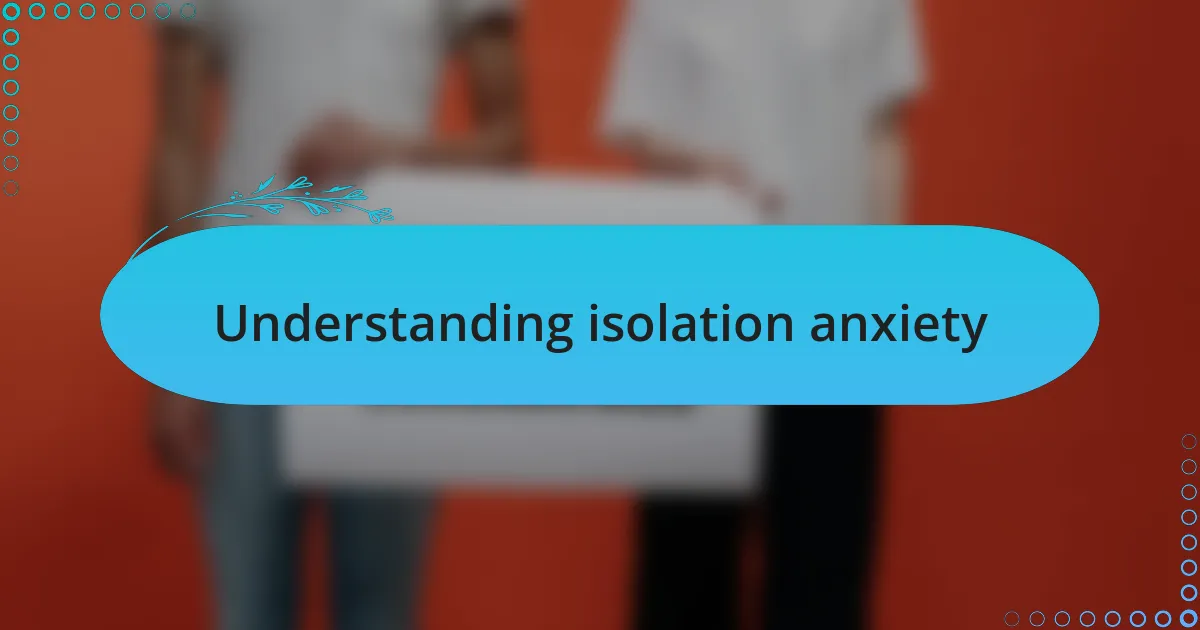
Understanding isolation anxiety
Isolation anxiety often manifests as a deep sense of unease and restlessness when separated from social interactions. I remember feeling an overwhelming sense of loneliness during lockdowns, where even a brief chat over the phone made a significant difference. Have you ever noticed how the absence of everyday connections can amplify feelings of fear?
When I found myself alone for extended periods, it was like my mind turned into a spiral of worry and self-doubt. I would lie awake, thinking about the world outside, questioning if I was missing out on experiences or if I’d forgotten how to engage with others altogether. What does it feel like for you to remain disconnected from familiar faces and places?
This type of anxiety can create a cycle that feels impossible to break — the more isolated I became, the more anxious I felt about reaching out. I often wondered, would anyone still want to talk to me after all this time apart? Reflecting on that experience now, it’s clear that grappling with isolation anxiety is not just about the absence of company; it’s about the emotional weight that solitude can carry.
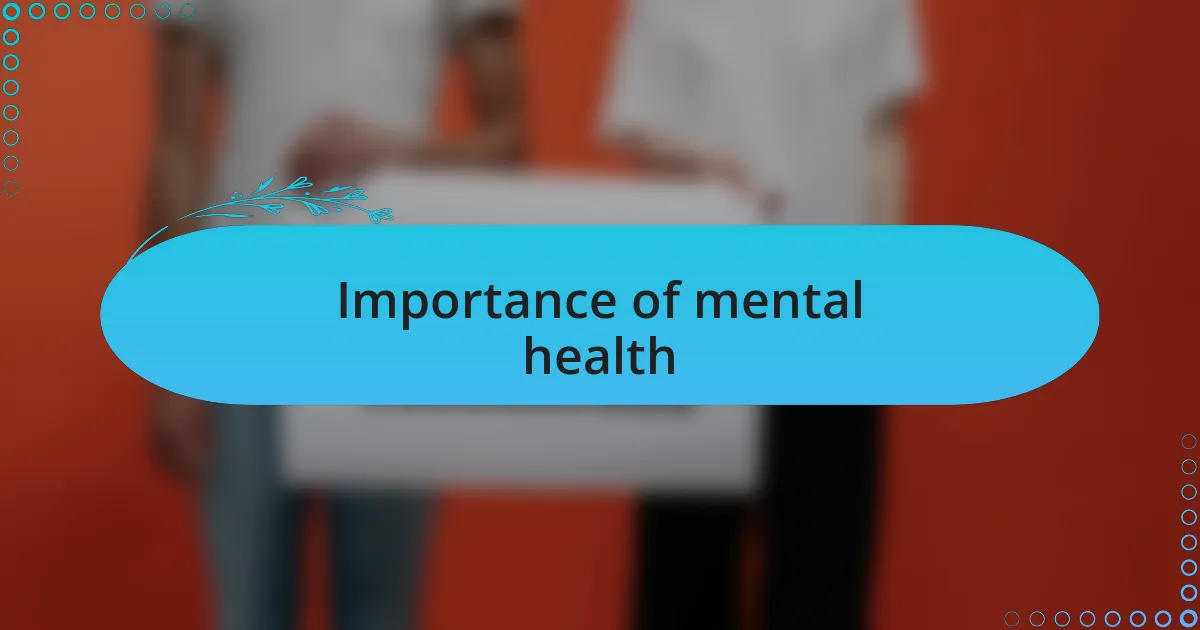
Importance of mental health
Mental health is often an overlooked aspect of our overall well-being, yet it plays a crucial role in how we cope with life’s challenges, especially during times of crisis. I recall those moments when the isolation felt suffocating, and I struggled to maintain a positive mindset. Have you ever considered how our mental state can influence our physical health and relationships?
Understanding the significance of mental health goes beyond academic knowledge; it’s about empathy and self-awareness. I remember feeling a weight lift when I began to talk about my feelings of anxiety with friends, discovering that they too had similar struggles. Isn’t it comforting to know that we’re not alone in our battles, even when we feel isolated?
In my experience, prioritizing mental well-being enables resilience against stressors like isolation. For me, finding small daily rituals, such as journaling or speaking my thoughts aloud, became lifelines when facing anxiety. Have you found unique practices that help ground you? Embracing these strategies nurtures not only our minds but also fosters deeper connections with others.
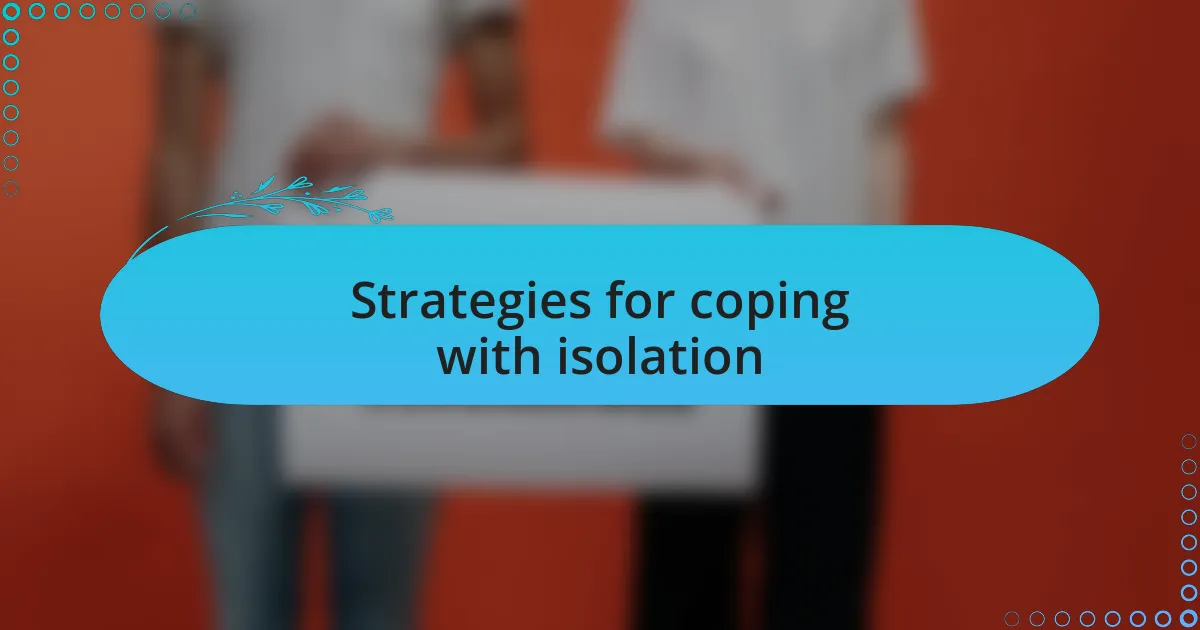
Strategies for coping with isolation
Finding ways to cope with isolation can be a personal journey for each of us. I discovered that establishing a routine helped anchor my days. Initially, I resisted the idea, thinking, “What’s the point?” But once I started setting small goals each day, like taking a morning walk or cooking a new recipe, I felt a sense of accomplishment. Have you tried creating a daily structure to enhance your mood?
Connecting with others, even if it’s virtual, significantly alleviated my feelings of loneliness. I remember setting up weekly video calls with friends—simple catch-ups that turned into lifesavers. That shared laughter, despite the distance, reminded me that I wasn’t navigating isolation alone. Have you ever felt that instant boost from a short conversation with someone you care about?
Mindfulness practices became essential for managing my anxiety during those quiet days. I began experimenting with meditation, and at first, it felt strange to sit in silence. However, over time, I learned to embrace my thoughts without judgment. It was a revelation to realize that stillness could foster peace. Have you explored mindfulness techniques that resonate with you?
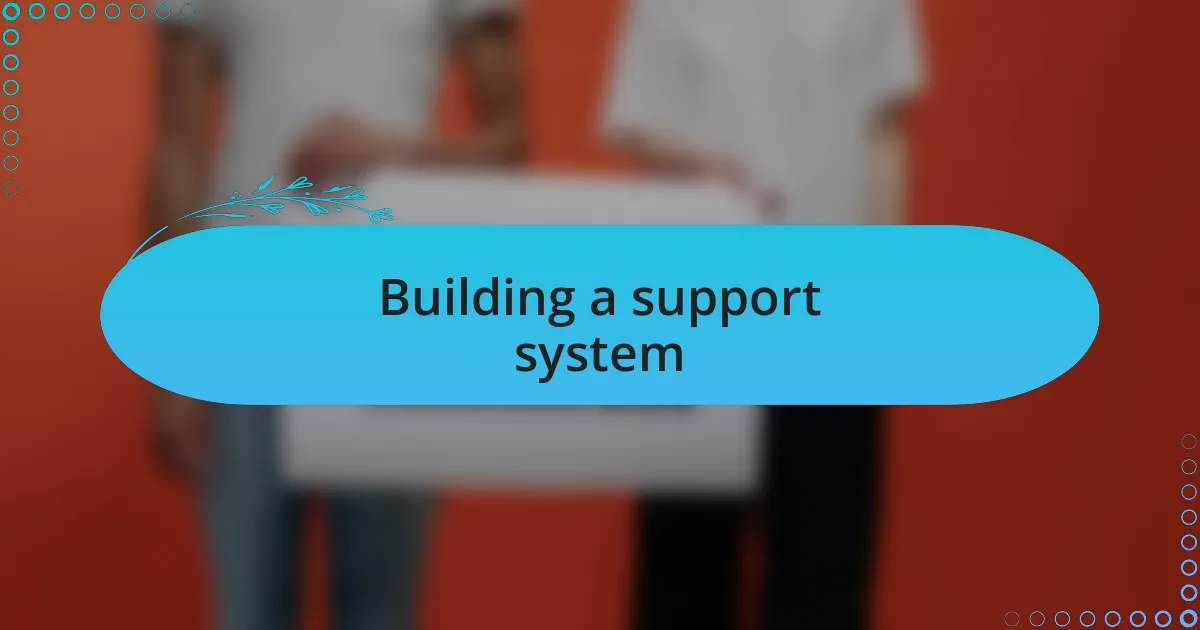
Building a support system
Reaching out to friends and family was a game-changer for me. I remember the first time I sent a text to a close friend after shutting myself in for a while. The warmth of their response was immediate and reassuring, reminding me of the connections I almost let fade away. Have you ever felt the power of just one supportive message?
In my experience, engaging in community groups, whether online or nearby, provided an unexpected layer of comfort. For instance, I joined a local virtual book club. Discussing a shared interest with others not only redirected my attention from my own worries but also cultivated a sense of belonging. Have you thought about how your hobbies could connect you with like-minded individuals?
What struck me most was the shared vulnerability in these support networks. Opening up about my struggles with isolation created deeper bonds with those I interacted with. I often found solace in knowing others felt similarly, and that shared humanity lifted us all. How often do you think we underestimate the strength found in community?
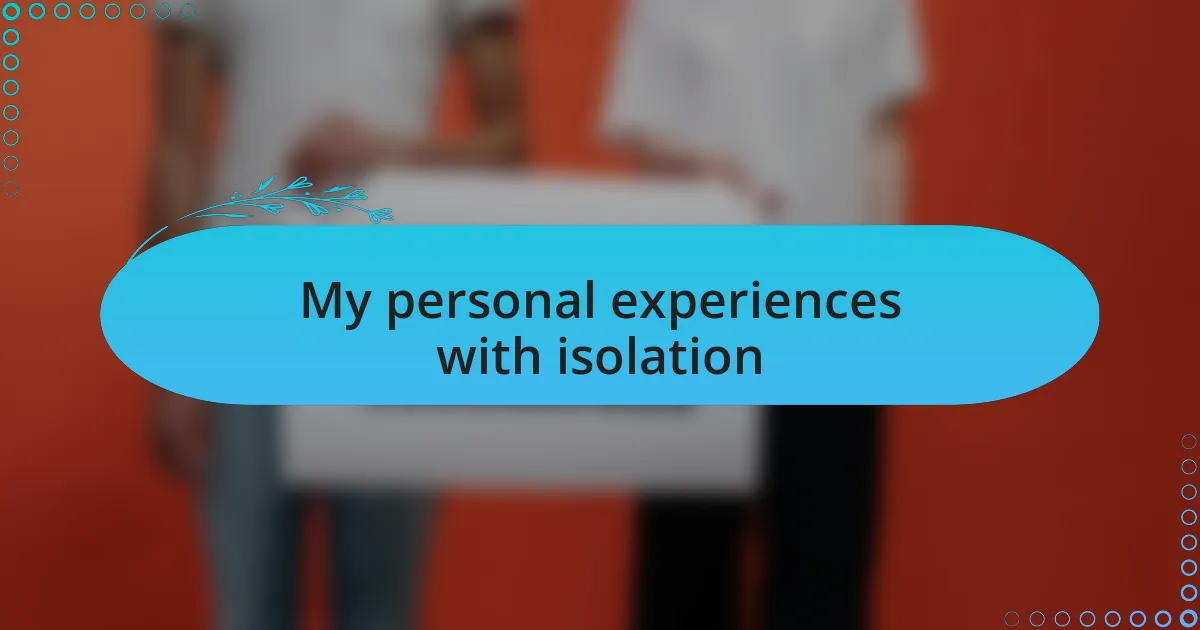
My personal experiences with isolation
During the early days of isolation, I often found myself staring at four walls, wrestling with an unsettling mix of boredom and anxiety. One day, I rummaged through old photo albums and rediscovered moments I had almost forgotten. Each snapshot pulled me back into a happier time, emphasizing the importance of nostalgia in fighting loneliness—don’t you agree that sometimes, memories serve as our greatest comfort?
I vividly recall a particularly difficult week when the weight of solitude felt unbearable. I decided to start a daily journaling practice. This simple act of putting pen to paper transformed my swirling thoughts into something tangible, allowing me to reflect on my emotions without judgment. It was like having a conversation with myself, and I began to wonder—could sharing these thoughts with others help them, too?
Another profound experience came from trying to maintain a routine. I set a goal to take a walk every day, no matter the weather. Those moments outside, even if just for a brief stroll, made me feel connected to the world again. Have you ever noticed how a breath of fresh air can shift your perspective? For me, it was a reminder that I wasn’t as alone as I often felt.
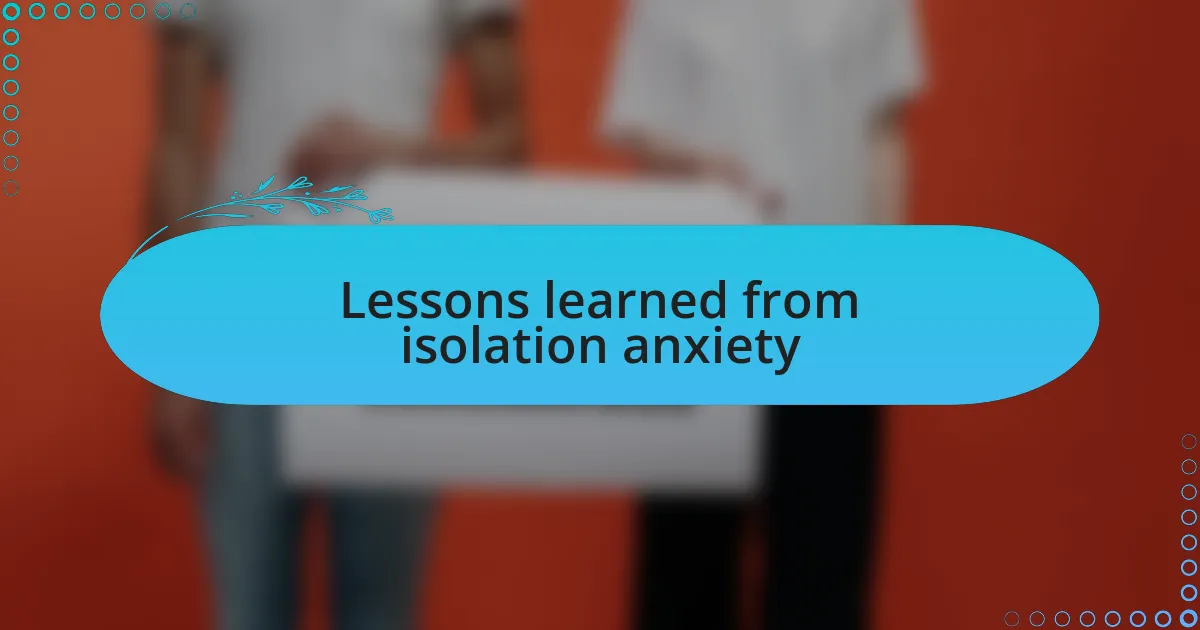
Lessons learned from isolation anxiety
Navigating through isolation anxiety taught me the vital role of self-compassion. I often found myself caught in a cycle of self-criticism for feeling low. However, one day, I decided to treat myself with the same kindness I would offer a friend. This simple shift in perspective stopped the negative self-talk in its tracks and fostered a sense of acceptance I had been missing.
Another key lesson emerged from embracing vulnerability. Early on, I hesitated to share my feelings, thinking it would burden others. But one evening, I confided in a close friend about my struggles. The relief I felt after opening up was profound. Isn’t it fascinating how sharing our burdens can lighten the load? It reminded me that connection is not just about being physically present; emotional transparency is just as important.
I also discovered the value of establishing boundaries. Initially, I overwhelmed myself with virtual meetups and online activities, thinking it would keep my spirits up. I soon realized that over-committing only heightened my anxiety. So, I learned to prioritize quality over quantity, giving myself permission to say no. This conscious choice was liberating, enabling me to focus on what truly mattered and creating space for my own well-being.